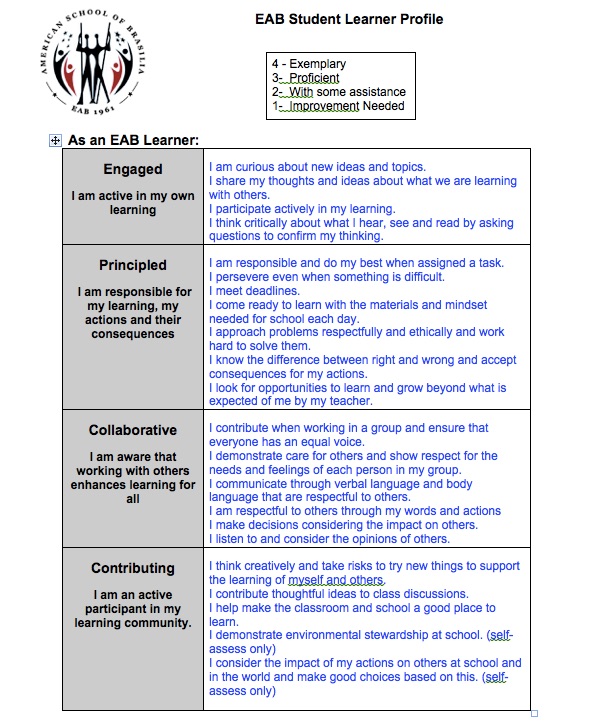“The function of education is to teach one to think intensively and to think critically. Intelligence plus character – that is the goal of true education.” ~ Martin Luther King, Jr.
After a yearlong review process, involving regular feedback and contributions from parents, students, and teachers through surveys, retreats, and focus group meetings, the school’s new mission statement was officially introduced at the start of this school year.
Learners inspiring learners to be inquisitive in life, principled in character, and bold in vision.
As part of an ongoing analysis of EAB’s new mission statement, this week’s post looks at the third element of the mission: “Principled in Character”.
The American School of Brasilia builds its educational program around the ideal of a whole child education that includes a focus on five pillars: academics, activities, arts, leadership, and service. Within this context, character education plays a critical role towards whole child development.
By way of example, EAB’s Character Counts! program has become a deeply integrated part of the Lower School, which also includes a monthly assembly led by students and regularly attended by over one hundred parents. The program is framed by six ethical values – Trustworthiness; Respect; Responsibility; Fairness; Caring; and Citizenship – which are used to further develop a positive school culture where students feel safe in their learning environment. The program also works to develop a culture of kindness in addition to addressing issues associated with bullying.
The Upper School recently engaged in a collective process, led by students, to establish a student honor code, which was approved and is now a essential part of the school’s culture. EAB’s student honor code reads as follows:
We, as students of the American School of Brasilia, give our pledge to live by the guiding principles of responsibility and respect in all that we say and do, understand that these values carry far beyond the classroom environment, affecting not only our peers and the activities we participate in, but who we are and who we will become, we commit to treat all people with compassion, be engaged and collaborative in all aspects of our education, and in all cases act with honor and integrity. We will uphold these values as the core of our identity, hence becoming principled individuals and contributing citizens to society.
EAB’s efforts in the area of “Principled in Character” are guided by our school’s Student Learner Profile (see below), which highlights how learners are Engaged, Collaborative, Contributing, and Principled. The Learner Profile further emphasizes the “principled” focus with the following statement: “As an EAB Learner, I am responsible for my learning, my actions, and their consequences.” This statement is then articulated with additional and more specific assertions:
- I am responsible and do my best when assigned a task.
- I persevere even when something is difficult.
- I meet deadlines.
- I come ready to learn with the materials and mindset needed for school each day.
- I approach problems respectfully and ethically and work hard to solve them.
- I know the difference between right and wrong and accept consequences for my actions.
- I look for opportunities to learn and grow beyond what is expected of me by my teacher.
Perhaps the best way to summarize EAB’s work with respect to the “principled in character” aspect of the school’s mission statement is to refer to a comment made during a professional development session. Dr. Michael Thompson, a renowned child psychologist, was asked to define a “moral school”. He responded by quoting another author (whose name I cannot recall), who stated, “A moral school is a school that is always talking about what it means to be a moral school.” This is a profound statement in how it highlights the importance of process and focus, rather than one definition that would inevitability lead to an oversimplification of a deeply complex issue.
It would be an act of hubris for EAB to claim, as a school, that it always has all of the right answers for all situations in relation to character and education. It certainly does not and nor does any school. However, what is important is to be always engaging in a collective conversation about character, in the context of programs such as Character Counts!, and working with guiding principles, as found in the Student Honor Code and Learner Profile.
Related Blog Posts:

Featured image: cc licensed (CC BY-NC-SA 2.0) flickr photo by Beccatevi questo! (Stròlic Furlàn – Davide Gabino) https://www.flickr.com/photos/56743832@N04/8662153499/
